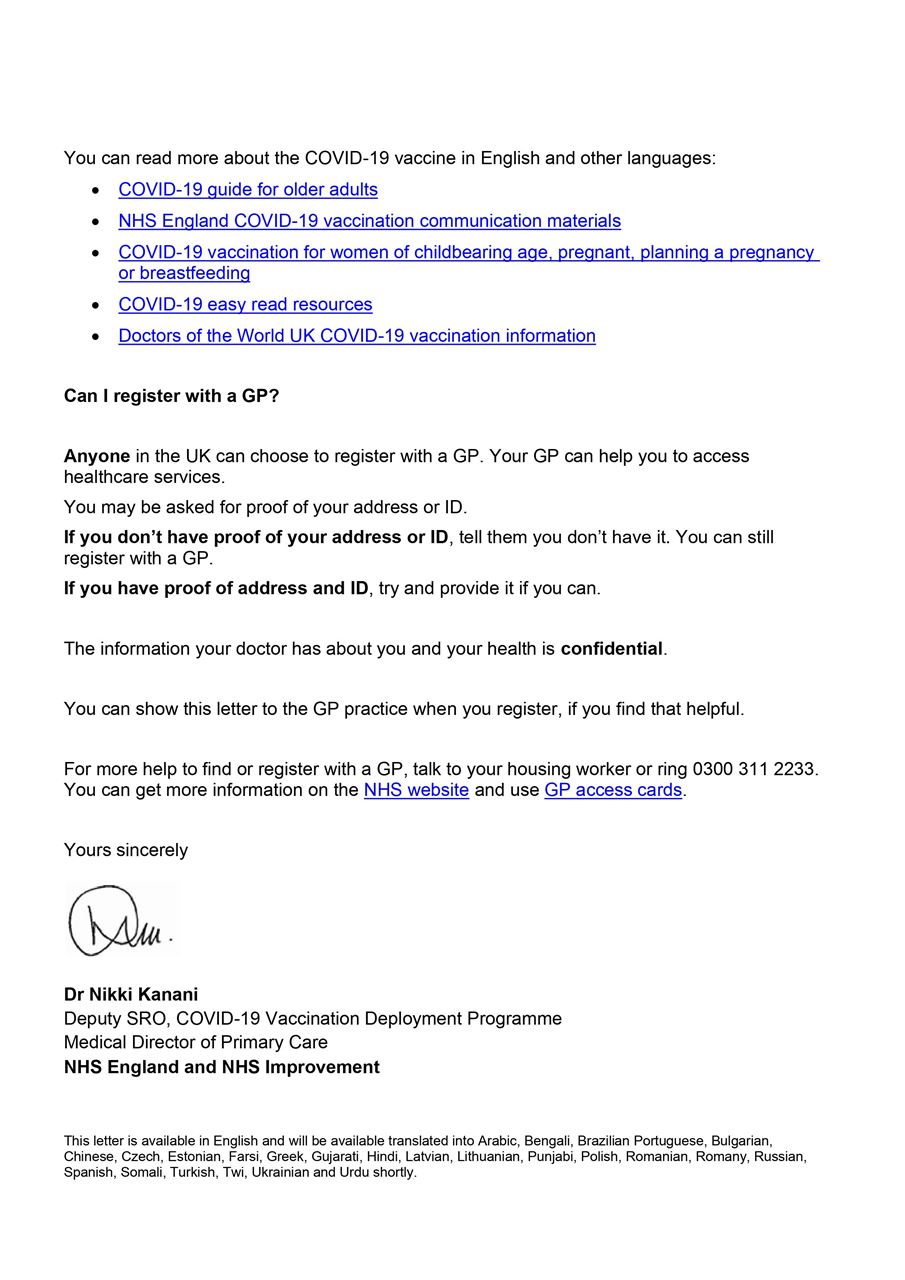Covid Vaccine Information
Why say yes to the Covid-19 Vaccine
COVID-19 Vaccination Migrant Invitation Letter


Booster New Guidance
OPTING IN
New guidance for booster vaccinations
In response to concerns about the new Omicron variant, the JCVI has recommended that booster vaccinations should be offered to all adults and that the gap between the second dose and booster is reduced to a minimum of 3 months. People who are severely immunosuppressed and have had their 3rd dose will also be offered a booster, a minimum of 3 months after their third dose.
These recommendations will come into effect from 13 December. As before, people will be prioritised according to age and risk, and we will contact you when it is your turn for your booster. Please do not contact the practice for an appointment until you are invited.
If you are aged 40 or over or in an at risk group and had your second dose 6 months ago, you can book your booster now at www.nhs.uk/covidvaccine or by calling 119. Otherwise, please wait to be contacted.
OPTING OUT
New guidance for booster vaccinations
In response to concerns about the new Omicron variant, the JCVI has recommended that booster vaccinations should be offered to all adults and that the gap between the second dose and booster is reduced to a minimum of 3 months. People who are severely immunosuppressed and have had their 3rd dose will also be offered a booster, a minimum of 3 months after their third dose.
These recommendations will come into effect from 13 December. As before, people will be prioritised according to age and risk, and the NHS will contact you when it is your turn for your booster. Unfortunately, we are not able to offer boosters to people under 40 due to the need to maintain other vital primary care services. However, there are several local vaccination services available which you will be able to choose from using the NHS National Booking Service.
If you are aged 40 or over or in an at-risk group and had your second dose 6 months ago, you can book your booster now at www.nhs.uk/covidvaccine or by calling 119. Otherwise, please wait to be contacted.
• those living in residential care homes for older adults
• frontline health and social care workers
• all adults aged 50 years or over
• all those aged 16 to 49 years with underlying health conditions that put them at higher risk of severe COVID-19 and adult carers • adult household contacts of immunosuppressed individuals
If you are eligible for a booster, you will be contacted by the NHS when it is your turn, either by your GP practice or the NHS National Booking Service. We will be working through groups in the same order as the first part of the vaccination programme, starting with care home residents and staff, frontline health and care workers and people aged 80 and over. It will also need to be at least six months since your second dose, so some people will not be contacted until the New Year.
Please do not contact the practice for an appointment, we will be in touch when it is your turn to have your booster.
Third doses for severely immunosuppressed
The JCVI has recommended that people who were severely immunosuppressed at the time of their first or second Covid-19 vaccination should be offered a third dose. This is an extra ‘top-up’ dose in response to evidence showing that they may not have responded as well to the vaccine as others and will therefore have lower levels of protection against Covid-19. It includes people with leukaemia and advanced HIV and people who have had recent organ transplants.
Consultants have been asked to identify eligible patients and recommend when the best time would be for them to have their third dose. Patients will be contacted either by their consultant or GP to arrange their vaccination, starting from mid-September.
More information, including answers to frequently asked questions, is available on the NHS Leeds CCG website
New guidance has been issued for the use of the Oxford AstraZeneca Covid-19 vaccine
This follows further reviews by the independent regulator, the MHRA, and the Commission for Human Medicines, of a very small number of people in the UK who have developed a rare blood-clotting condition since having the Oxford AstraZeneca Covid-19 vaccine.
The MHRA and Joint Committee for Vaccinations and Immunisations have emphasised that the risk of this condition is extremely small and that the benefits of the vaccine outweigh the risks for the vast majority of people. They have recommended that:
- Everyone who has had the AstraZeneca vaccine should still have a second dose of the AstraZeneca vaccine, irrespective of age, unless they have had a blood clot or have an existing risk of thrombosis (blood clotting)
- People aged 30 and over or who have a health condition that puts them at higher risk of severe Covid-19 disease should still be offered the Oxford AstraZeneca vaccine. The benefits in protecting them against the serious consequences of COVID-19 outweigh any risk of this rare condition.
- People aged 18-29 who do not have a health condition that puts them at higher risk of severe Covid-19 disease will be offered an alternative Covid-19 vaccine where available. (This has been recommended as a precaution as people under 30 are at less risk from Covid-19 and not because they are considered to be at particular risk of developing the rare blood clot.)
- People under 30 can still choose to have the Oxford AstraZeneca vaccine if this will mean they can be protected more quickly and they have been made aware of the guidance.
Please see the leaflet below that has been produced by Public Health England and the NHS to answer any questions you may have